Value-430 430W True Power Compact PSU Discontinued | |
| More variations available Show | |
Nexus Value-430 430W True Power Compact PSU
When building or upgrading a computer, keep in mind that the power supply can be considered as the beating heart of the PC system (with the CPU being the brains). The power supply is the most critical component when it comes to the stability of your system. Irregular and unstable voltage rails will cause unstable performance and more system crashes.
Nexus power supplies are constructed without any compromises on component quality. They choose only the best components and because of this, cooling can be done in a quiet manner. A solid fan with the utmost quiet bearings will keep the power supply cool and running smoothly.
The Nexus Value 430 is a 430 Watt power supply, with more than 80% efficiency, sleeved cables and an ultra compact design; it is a perfect solution for a silent PC.
Features
- 430 Watt true power PSU
- 80% efficiency; complies with 80PLUS specifications
- Inaudible performance; 12cm fan from 15dB(A)
- Sleeved cables
- Active PFC
- Excellent airflow, honeycomb grill
- Full range automatic
- Multiple safety features such as overvoltage and short-circuit protection
- Ball bearing fan
- Complies to WEEE & RoHS
By carefully selecting each and every component, Nexus aims at creating the best possible mix of components to make their power supplies as quiet as possible. Carefully balancing performance and noise levels to get the best of both worlds. Confident that their power supplies are leading the market when it comes to solid performance at the lowest possible noise levels.
The noise levels of the power supplies are tested in an ISO certified chamber. This chamber is the industry’s standard for noise tests; with the background noise in such a chamber having as little as 15dB(A). Any product producing less noise then 15dB(A) cannot be measured. The graph below shows the noise levels at different loads.

The Nexus VALUE-430 power supply is guaranteed to provide you with over 80% efficiency. This means the power supply is using the power it is drawing from the wall outlet more efficiently and less electricity is wasted. Obviously this is better for the environment and it saves your electricity bill! Also, a more efficient power supply also results in a cooler power supply.

Finally, the Nexus Value 430 is slightly smaller than an ATX form factor power supply, so and it will fit in any ATX form factor computer case. This smaller size results in more space inside the PC for more/better airflow. The Value 430 has a length of just 12.5cm. Compared to regular ATX power supplies that is 1.5cm shorter and 4 to 5.5cm shorter than some modular power supplies.

Review
silentpcreview.com
The Nexus Value 430 makes a bold leap to the very top of our quiet PSU rankings. It is the quietest fan-cooled PSU we’ve yet tested… At such vanishingly quiet levels, this is no mean feat. That it is achieved by a modest, unassuming product with a name like Value 430 is even more surprising, especially when you consider that the other top contenders are high end models from giants in the power supply field. It even begs the question of why you’d pay big bucks for a fanless PSU of similar power rating.
| Specifications | Value 430W |
|---|---|
| ATX12V Version | v2.2 |
| 20+4-pin ATX Connector | Yes |
| ATX12V (4-pin) support | Yes |
| EPS12V (4+4-pin) support | Yes |
| PCI-E support | Yes, 1x 6+2-pin and 1x 6-pin |
| Number of floppy drive connectors | 1 |
| Number of hard drive connectors | 6 |
| Number of SATA power connectors | 4 |
| Master power on/off switch | Yes |
| Acoustic noise level | From 15.5 dB(A) |
| Fan size | 120mm, thermally controlled |
| Length of motherboard power cable | 35 cm (approx) |
| +3.3V maximum output current | 24 A |
| +5V maximum output current | 24 A |
| +12V1 maximum output current | 20 A |
| +12V2 maximum output current | 20 A |
| +12V3 maximum output current | 20 A |
| +12V4 maximum output current | 20 A |
| -12V maximum output current | 0.5 A |
| +5VSB maximum standby current | 2.5 A |
| Combined maximum output +3.3V / +5V | 140 W |
| Mains input voltage | Full range automatic |
| Physical dimensions | 86 x 150 x 125 mm |
| Certificates | CE, WEEE, RoHS, UL, CB, TUV, FCC |
| Warranty | 24 months |
| EAN barcode | 8717371694302 |
| Specifications | Value 430W |
|---|---|
| ATX12V Version | v2.2 |
| 20+4-pin ATX Connector | Yes |
| ATX12V (4-pin) support | Yes |
| EPS12V (4+4-pin) support | Yes |
| PCI-E support | Yes, 1x 6+2-pin and 1x 6-pin |
| Number of floppy drive connectors | 1 |
| Number of hard drive connectors | 6 |
| Number of SATA power connectors | 4 |
| Master power on/off switch | Yes |
| Acoustic noise level | From 15.5 dB(A) |
| Fan size | 120mm, thermally controlled |
| Length of motherboard power cable | 35 cm (approx) |
| +3.3V maximum output current | 24 A |
| +5V maximum output current | 24 A |
| +12V1 maximum output current | 20 A |
| +12V2 maximum output current | 20 A |
| +12V3 maximum output current | 20 A |
| +12V4 maximum output current | 20 A |
| -12V maximum output current | 0.5 A |
| +5VSB maximum standby current | 2.5 A |
| Combined maximum output +3.3V / +5V | 140 W |
| Mains input voltage | Full range automatic |
| Physical dimensions | 86 x 150 x 125 mm |
| Certificates | CE, WEEE, RoHS, UL, CB, TUV, FCC |
| Warranty | 24 months |
| EAN barcode | 8717371694302 |
Customer Reviews
Genuinely quiet PSU
Ordered the product yesterday - arrived today; good start. Easy fit (~5 mins).
Checked readings with a measurement app on the iPad:
- PC off - desktop reading 37dB, floor (next to PC) 37dB (room background)
- PC on, old stock PSU - desktop 43dB, floor 50dB
- PC on, Nexus 430 PSU - desktop 38dB, floor 40dB
I’ve never heard myself type so loud! Fantastic product.
Great Price & Performance
Got this one as the Scythe 500W was out of stock and I was looking for something a bit cheaper than the Nesteq (fanless = silent, I have the older model) but better spec than the Red Wing cheapie (also quiet but not great efficiency). Came as described, slightly smaller than normal, fitted fine, leads nice and long. Runs virtually silent even in an older Thermaltake case with it above the CPU. The HD seek is about the noisiest now. Fine powering an AMD x2 250 and GT240.
UPDATE: Still running fine after 12 months. The fan on my Redwing died after 3 years service and the Nesteq stopped working after 18 months (as a B grade item had only 12 months warranty). I will now only buy PSU’s with good reliability track record and high efficiency or 5 year warranty. So far so good with the Nexus.
Very Pleased
Very pleased with this power supply - it arrived next day as promised and it is really amazingly QUIET as a mouse which is exactly why I bought it. Neatly packaged too, you will not be disappointed unless you are a gamer who needs a much bigger supply. A quality supply at a reasonable price, definite winner!
Lives up to the hype
Even when I switch off every other source of noise inside my PC, I still can’t hear it.
Quietest PSU ever!
Awesome power supply - runs so quiet I can hear the heads on the discs moving! More cables than I know what to do with ;) Only downside is that the box runs a few degrees warmer than with previous (23dB) power supply (so lose a star for this).
FAQ
Do high wattage power supplies cost more to run?
No - the rated wattage of a power supply refers to the maximum amount of power it can deliver at full load, not how much power it uses. More powerful PSUs will consume around the same amount of power as lower powered power supplies in any given PC system, so your electricity bill will not be higher when using a more powerful power supply!
The best way to reduce your electricity bill when using your PC is to use a more efficient power supply or make your PC consume less power by removing components which are not needed, such as extra drives and expansion cards, or by choosing a cooler-running processor or graphics card.
My brand new power supply doesn’t work! Am I doing something wrong?
It’s possible that the power supply may be faulty, but here are some simple things to check. Firstly, a power supply will not work if you simply plug it in and flick the switch. The power supply will only turn on if you connect it to a working motherboard and associated items (processor, memory, video card, etc). It is actually the motherboard which tells the power supply when to switch on.
Secondly (if applicable), check the voltage is set correctly to 115/230 volts depending on what country you are in. Thirdly, if possible it would be good to try the power supply in another PC to see if it works, or try another power supply in your PC to see if that works. You can then tell whether it is the power supply which is faulty or the actual PC itself. If all else fails, please contact us for further support, and/or return details.
Why should I buy a whole new PSU when I could just replace the noisy fan in my existing one?
Virtually all the noise generated by a PC power supply originates from the cooling fan inside it, so simply replacing the fan with a quiet fan may seem an obvious way to go. However, if you are thinking about attempting this operation, please bear the following points in mind:
- Your existing power supply will be designed to run with a specific amount of airflow in order to adequately cool the components inside and reducing the airflow may lead to overheating and damage to the power supply and/or PC.
- All PC power supplies contain very high voltages and even with the power disconnected, the voltages stored in the capacitors can be easily enough to kill. It is not recommended to take the cover off any PC power supply for this reason unless you are absolutely confident of your own ability. Because of the grave dangers involved, all PC power supplies by law carry a warning label forbidding removal of the power supply case.
- There will be no standard PC fan connector inside the power supply to use to connect a replacement fan, and it would probably have to be soldered directly into the PCB inside the power supply, or have a specialist power connector attached. This can be a tricky operation to say the least.
Please consider the above points very carefully before proceeding with an operation to replace the fan in your existing power supply!
What is PFC (Power Factor Correction)?
If you are interested in being “green” and saving the planet, you might like to read a short explanation of how our power supplies can save energy using Active PFC (Power Factor Correction), not to be confused with Power Conversion Efficiency which is also very good in most of our PSUs. “Power Factor” is a measure of how efficiently electrical power is consumed. Ideally, Power Factor would be 1 (or 100%) and known as unity.
Unfortunately in the real world, Power Factor is reduced by highly inductive loads down to values of 0.7 (70%) or less. This induction is caused by equipment such as small electric motors, fans, fluorescent lighting ballasts and transformers such as those in PSUs. This is bad news for the electricity generating companies who can impose a surcharge on heavy users if they have a consistently low Power Factor, as more electricity has to be produced to make up the shortfall.
Power Factor Correction (PFC) is used in some equipment to minimise the inductive component of the electrical current. This helps to reduce the losses in the electrical supply to that equipment. Power Factor Correction capacitors are normally used to reduce induction in an electrical load, which minimises wasted energy and hence improves the efficiency of a company and reduces electricity costs.
It is not usually practical to reach unity, i.e. Power Factor 1, and it seems that most electricity supply companies accept consumers having a Power Factor as low as 0.94 (94%) without imposing a surcharge. Unfortunately most of the cheap (and not so cheerful) PSUs tend to have a Passive PF as low as 0.75 or 75% which in a large office can lead to a PF surcharge.
However, the good news is that most of Quiet PC’s PSUs implement a system known as Active PFC which involves some clever electronics. This means that their power factor (PF) can be as high as 0.94 or 94% (at full load), while harmful harmonic frequencies are reduced to well below legal requirements. So by using our products, you can be happy in the knowledge that you are doing your bit to save the planet!
How do I know what size of wattage power supply I need?
The best answer we can give to this question is to go ahead and take an intelligent “guesstimate”! There are no hard and fast rules about what size of power supply any given PC needs as a minimum. Our advice would be that if you are replacing an existing power supply, then consider a new one at least of the same wattage as the old one. In addition, if you wish to build in a “safety margin” to allow for reliable running and possible future upgrades, consider adding 100-200 watts to the rating of your existing unit.
If you are building a new PC, most customers now buy a power supply rated in the region of 500-800 watts depending primarily on the performance level of their graphics card(s) and number of drives to be installed. But in any event if you are unsure about which power supply would be best for your PC then please do contact us by phone or email and we will be happy to give you a specific recommendation based on your budget.
My new PSU came with a 24-pin connector but my motherboard needs 20 pins! Do I need an adaptor cable?
We receive many customer enquiries about this. In fact, most of the 24-pin compatible power supplies we sell come with special motherboard connectors which can be converted to 20-pins with no additional conversion cables. All you need to do is look carefully at the connector and you will see that the end four pins can be slid off, turning the connector into a 20-pin compatible one (see below) - easy when you know how!
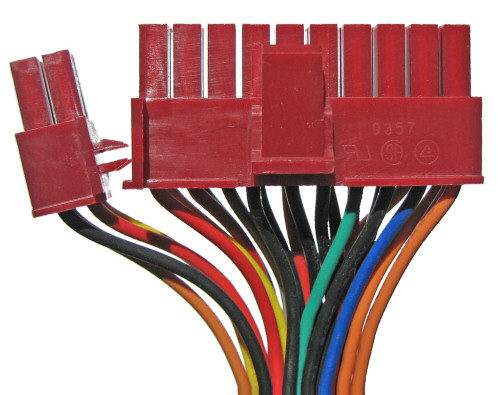
Image showing how to change a power supply’s 24-pin motherboard connector into a 20-pin connector by unclipping the end four-pin blockWhat do the PSU safety protection abbreviations mean?
There are many possible safety protections a PSU can have. Below is a list of what each abbreviation means. Please note, not all PSUs have all safety protections.
- OCP - Over-Current Protection
- OVP - Over Voltage Protection
- UVP - Under Voltage Protection
- SCP - Short Circuit Protection
- OPP - Over Power Protection
- OTP - Over Temperature Protection
- UL - Underwriters Laboratories, more information.
- TÜV - Technical Inspection Association, more information.
- CE - European Conformity, more information.
- FCC - Federal Communications Commission, more information.
- RoHS - Restriction of Hazardous Substances Directive, more information.
- WEE - Electronic waste, more information.
- 80 PLUS - Promotes energy efficiency for PC power supplies, more information.
- ErP - Energy Related Products, more information.
More information on certification marks can be found here.
Top Quiet Power Supplies
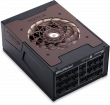
Seasonic PRIME TX-1600 Noctua Edition 1600W 80Plus Titanium Semi-Fanless PSU

Seasonic PRIME Fanless 500W 80PLUS Platinum Modular Power Supply

Streacom ST-NANO160 160W nanoPSU and AC/DC adapter block

Streacom ST-ZF240 ZeroFlex 240W Passive PSU

Seasonic PRIME Fanless 700W 80PLUS Titanium Modular Power Supply

FSP Hydro Ti Pro 1000W 80PLUS Titanium Fully Modular ATX 3.0 PSU
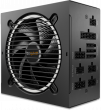
be quiet Pure Power 12 M 750W 80+ Gold Fully Modular ATX3.0 PSU
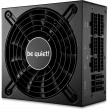
be quiet 600W SFX-L Modular 80PLUS Gold PSU
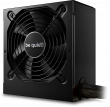
be quiet System Power 10 650W 80Plus Bronze PSU
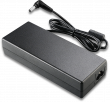
Akasa 120W Thin mini-ITX power adapter, AK-PD120-04M


